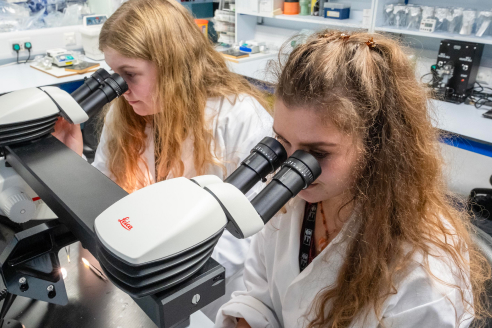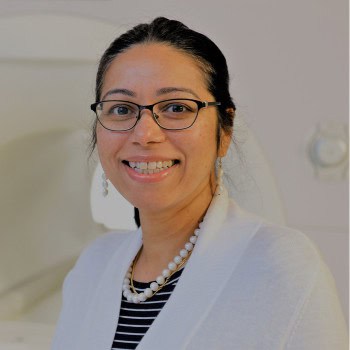
This year, we have awarded all four of our new Discovery Research Grants to exceptional women working in the field of hearing research.
We hope these grants – which all start later this year – will help researchers find new ways to prevent hearing loss, restore hearing and silence tinnitus, as well as improve how well people can hear through their hearing aids and cochlear implants.
Our Discovery scheme supports world-class research to generate new knowledge about hearing loss and tinnitus. The new projects cover a range of topics, from tinnitus to cochlear implants to vestibular schwannomas (benign tumours that grow on the auditory, or hearing, nerve).
We’ve been funding grants through our Discovery scheme for 25 years, and in that time, we’ve funded 120 projects totalling more than £17 million.
Developing new treatments for tinnitus
Two of the new projects we’re funding this year focus on developing new treatments for tinnitus.
Professor Fatima Husain at the University of Illinois, USA, will lead research to advance a new potential treatment for tinnitus based on a technique called neurofeedback. She hopes to be able to develop this technique to help people with tinnitus to become less aware of, and less bothered by, their tinnitus. This research project will be an important step towards achieving her aims.
Professor Fatima Husain, University of Illinois, USA:
For nearly two decades, the main effort of my lab has been to understand as much as we can about tinnitus, particularly its brain mechanisms. We are now in a place where we can use that knowledge to develop new treatments. We plan to test our new theory about the central role played by a specific brain region in the awareness of tinnitus. By modifying its activity, we hope to reduce this awareness, and reduce the severity of the bothersome symptoms associated with tinnitus. If we didn’t have this support from RNID, we would not be able to test this new treatment. “

Dr Emilie Cardon at the University of Antwerp in Belgium will take forward a different approach to treating tinnitus in her research. She will conduct a study to advance a potential treatment for tinnitus which uses personalised non-invasive electrical brain stimulation (called transcranial direct current stimulation) to reduce tinnitus perception.
Dr Emilie Cardon, University of Antwerp, Belgium:
RNID funding will offer us the opportunity to push our research into non-invasive brain stimulation as a potential treatment for tinnitus to new heights. This grant will enable us to explore innovative approaches and deepen our understanding of how transcranial direct current stimulation (tDCS) can be optimized for better outcomes. I’m excited to see where this new direction takes us and how we can learn even more about the intricacies of tinnitus and its treatment. For me personally, obtaining this grant for a project that I will be responsible for as a junior researcher feels incredibly rewarding and exciting, representing a major step in my research trajectory.”

The next generation of cochlear implants
Current cochlear implant technology is unable to replicate the fine detail of sound information experienced in natural hearing, meaning that hearing through an implant is especially challenging in certain situations (such as background noise or when listening to music). We’re funding Dr Rachael Richardson at the Bionics Institute of Australia to carry out a project to further the development of a new type of cochlear implant which uses light to stimulate the auditory nerve, which is expected to lead to a richer, better hearing experience for people with cochlear implants.
Dr Rachael Richardson, the Bionics Institute of Australia:
It’s incredible to be an integral part of the research community funded by RNID who are working in partnership to investigate new solutions for people living with hearing loss. RNID has supported my research since I first started working on the concept of using light stimulation to improve cochlear implants. Their willingness to support my research at an early stage was vital to build the evidence needed to secure government funding. I’m thrilled to receive this grant to help progress this research into clinics.”

Reducing the impact of vestibular schwannomas
Vestibular schwannomas are benign brain tumours which grow on the auditory nerve. They can cause hearing loss and tinnitus (as well as balance problems) and are currently treated by radiotherapy or surgery to remove them. In some cases, this can lead to permanent hearing loss and tinnitus. We’re funding Paramita Baruah, a Consultant ENT surgeon and scientist (University of Birmingham, UK), to investigate the role of inflammation and metabolism in tumour growth. We hope she’ll be able to identify biomarkers (biological molecules found in blood, other body fluids, or tissues that can identify the presence of a condition or disease) to improve how these tumours are diagnosed and treated.
Paramita Baruah, Consultant ENT surgeon and scientist (University of Birmingham, UK):
The grant from RNID will help us perform seminal research to understand how this challenging tumour and the immune system interact with each other. The research will employ state of the art techniques called ‘transcriptomics’ which will allow my team to study the genetic makeup of individual tumour cells in detail. I hope this will lead to the development of new tools to boost the immune response against the tumour, that will help to preserve hearing and reduce tinnitus.”

